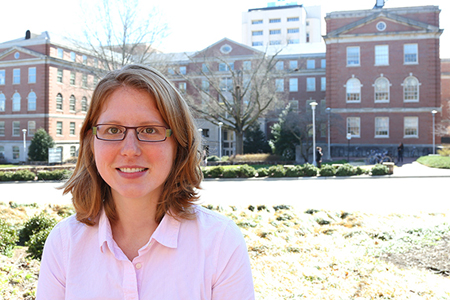Nutrition student examines diet and diabetes in China
May 23, 2014
An article written by Marla Broadfoot of the NC TraCS Institute and containing information that appears in this profile, appeared first on the UNC Health Care website.
Lindsay Jaacks has loved science since grade school; it was just a matter of deciding which branch she’d pursue. She conducted undergraduate research in a plant pathology lab but then became more interested in nutrition biochemistry. As soon as she landed her own funding to do nutrition research, she realized she had found her calling.
Jaacks, a doctoral student in nutritional epidemiology at the UNC Gillings School of Global Public Health and UNC School of Medicine, is conducting the first known study of diet and Type 1 diabetes in a developing country – China – and looks forward to postdoctoral research that includes a study of environmental pollutants and how they interact with diet to affect health outcomes, including diabetes.
Jaacks’ mentor at the Gillings School is Elizabeth Mayer-Davis, PhD, professor and chair of the Department of Nutrition. Mayer-Davis is the national chair for SEARCH for Diabetes in Youth, a large, multi-center study, and is principal investigator for the UNC study site. When she arrived at UNC, Jaacks was drawn to Mayer-Davis’ work and recalled being willing to “do just about any project” if it meant she would have the opportunity to learn from Mayer-Davis.
After presenting at an international scientific meeting, Jaacks chatted with the president of the Chinese Diabetes Society, who was interested in collaborating to compile data on the dietary habits of people in China with Type 1 diabetes. At that point, no one had ever gathered such information in China or any other developing nation.
“Because it’s such a populous country, the absolute number of people with Type 1 diabetes is greater in China than in the U.S., but [the percentage of people] with the disease is actually among the lowest in the world,” Jaacks said. “We don’t actually know why it’s lower – it could be genetic or dietary factors. It’s hard to say because we still don’t understand what triggers Type 1 diabetes.”
With a small award from UNC’s NC Translational and Clinical Sciences (NC TraCS) Institute, Jaacks was able to jump-start her dissertation project, spending five months in China collecting blood samples and dietary surveys from 100 people with Type 1 diabetes. Her pilot work led to a larger grant from Sanofi, a pharmaceutical company that provided further support for data collection and enabled her to finish analyzing data and publish results.
Jaacks was surprised to discover a stigma attached to having Type 1diabetes in China. For that reason, she modified her studies by conducting the majority of food surveys and patient interviews over the phone rather than in person. Her research also uncovered a number of interesting findings.
“Over half of participants did not eat fruit because they had been told that it was very bad for their diabetes,” she said. “Overall, we saw that there was more of what I would call an ‘old-school’ management of diabetes, with patients on a very rigid diet where they eat the same thing at the same time every day. That is in contrast to the United States, where patients have access to ready supplies of insulin that they can take before a meal so they can eat more of what they want.”
When Jaacks moved to China, the country was in the midst of an air pollution scare, which clouded both her own experience abroad as well as her ability to advise patients on how to make healthy choices to manage their disease.
“I stayed inside most of the time, and if I had to go outside on days when it was particularly bad, I made sure to wear a mask,” she said. “That was the biggest thing, personally. I couldn’t run like I wanted to run, and I was hesitant to eat certain vegetables because they could be tainted with pollutants. There are all these recommendations you give people with diabetes – eat lots of vegetables, get out and exercise – but this advice is confounded in Beijing and many cities in China because of air pollution.”
When Jaacks finishes her dissertation later this year, she plans to shift gears to study environmental pollutants and how they interact with diet to affect health outcomes.
“It isn’t just what food we are eating that’s changing, but also how we grow that food,” she said. “We need to improve our understanding of non-nutrient food exposures – pesticides, herbicides, fungicides – that may be partially responsible for the obesity and diabetes epidemics seen around the world. Interventions that improve agricultural practices and reduce exposure to these chemicals will not only improve human health, but also environmental health.”
Jaacks noted that she might not have been interested in studying the interactions between environmental and human health if she hadn’t experienced the serious air pollution in China.
“Recently, my project manager emailed me to say her daughter had just pointed [upward] and said, ‘The sky is yellow,’” Jaacks said. “That’s a disturbing contrast to the blue skies we enjoy here in the United States.”
Gillings School of Global Public Health contact: David Pesci, director of communications, (919) 962-2600 or dpesci@unc.edu.

